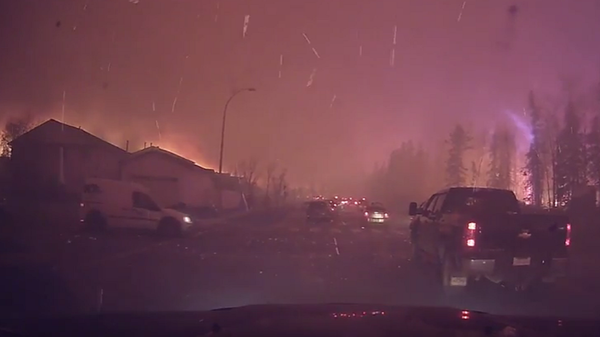Canadian firefighters have made a valiant effort to beat back the monster 2,290 square kilometer wildfire which rocked the community of Fort McMurray and its environs at the beginning of the month. The disaster, which has impacted Canada's oil sands operations, is on course to becoming the costliest disaster in Canadian history.
About 700 firefighters, twenty-six helicopters and 13 air tanker planes are involved in the effort to fight the Fort McMurray blaze, with another 850 firefighters, 95 helicopters and 15 tankers fighting other wildfires across the province.
But as Canadians take a breather from fighting the destructive forces of nature, political commentators are trying to add fuel to another blaze, this time in the international political arena.
Earlier this week, Canadian Prime Minister Justin Trudeau graciously turned down offers by Russia, the US, Mexico, Australia, Israel, the Palestinian Authority, and Taiwan to help battle the Alberta wildfires. Canada, he said, has the resources necessary to deal with the emergency. At the same time, the prime minister said that he was profoundly touched by the offers of support.
Last week, the Russian Emergencies Ministry offered its assistance, announcing that they were prepared to send Il-76 fire-fighting water bombers to help defeat the blaze. Canadian officials politely said that they would take the offer into consideration.

Unfortunately, not everyone has been as polite. In an op-ed for The Globe and Mail newspaper on Wednesday, foreign affairs commentator David Bercuson called out Russia, triumphantly calling his piece "Trudeau was right to refuse Russia's help with Fort Mac fire."
Bercuson, a professor at the University of Calgary's School of Public Policy and fellow at the Canadian Global Affairs Institute, emphasized that Ottawa's decision to decline Russia's help "was the right call."
"And although some Canadians think the Prime Minister is being narrow-minded, or too eager to cozy up to Washington in refusing Russian help, the decision actually shows a growing sophistication on the part of the Prime Minister and his advisers about Canada's place in the world and who is – and who is not – aligned with our national interests," he added.
If Canada does end up needing help, he said, it won't be asking Russia, but will "turn to the United States." Canada, "as an independent country highly dependent on the United States for trade, security and defense, [needs] to proceed carefully when it comes to dealing with Putin's Russia."
The Russian president, Bercuson noted, 'annexed Crimea', supports separatists in eastern Ukraine, threatens the Baltic states, "deliberately provokes the US Navy and Air Force" off Russia's maritime borders in the Baltic Sea, and perhaps worst of all, "backs President Bashar al-Assad of Syria with military power."
Trudeau's rejection of Russian aid specifically, the analyst explained, is a righteous declaration that Canada would not "return to business as usual with Mr. Putin's Russia." Ottawa, he emphasized, is "displaying a refreshing hard-headedness by refusing to woo Russia in some misguided and indeed dangerous effort to balance our dependence on the United States with a new relationship with Russia. Or by allowing Russia to woo us."
Needless to say, not all Canadians share Mr. Bercuson's sentiment. Not seeing in the 'deep geopolitical significance' of accepting an offer to help, many Canadians suggested that in this case, Ottawa shouldn't look a gift horse in the mouth.
Alberta needs help. Why decline offers of international assistance for the #FortMacFire? @JustinTrudeau https://t.co/cQdJyCbHXp
— D Lewis (@LarryTGrape) 10 мая 2016 г.
@BRossta Canada loses an entire city, gets offered help, but Justin says "Nah we got dis mang." #fortmac #wildfires https://t.co/Ijp6uJxggK
— VanArts Radio (@vanartsradio) 10 мая 2016 г.
Politics aside, Russia’s intention WAS TO HELP Canada fight fires https://t.co/K4xoJk5TnK
— Randy Fountain (@Randy_Fountain) 11 мая 2016 г.
Can any firefighters weigh in on this? What am I missing? Don't more hands make light work? https://t.co/HX917iyBoX #FortMacFire #FortMac
— 89.3 K-Rock (@893KRock) 10 мая 2016 г.
Help is Help, guess not when the #Russians are offering huh https://t.co/IvfizDFPqg
— Daniel Yazelle (@Obsideondemon) 9 мая 2016 г.
#humanitarian when Russia makes a gesture by offering water bombers to help with Canadian fires, the right thing is to accept and say thanks
— Kirk Driscoll (@KirkDriscoll) 11 мая 2016 г.
To Russia with love. The only ones to offer Canada help! @jennasmombx @willripleyCNN @smerconish @cnni @LisaAlesci pic.twitter.com/v7OSIsecin
— Sharon Patton (@swood777) 10 мая 2016 г.





